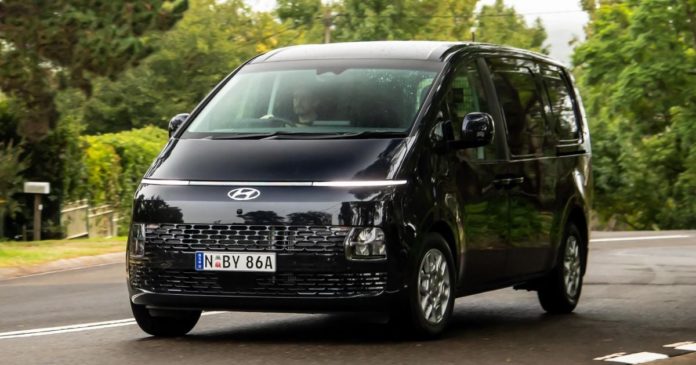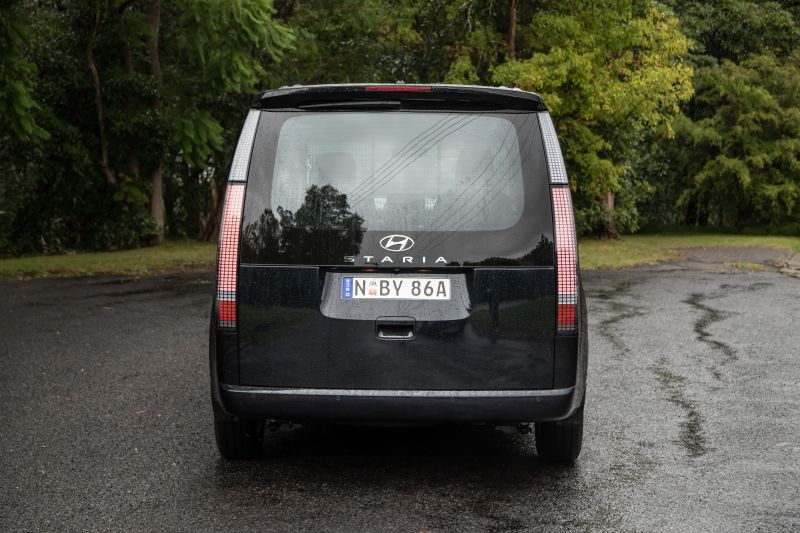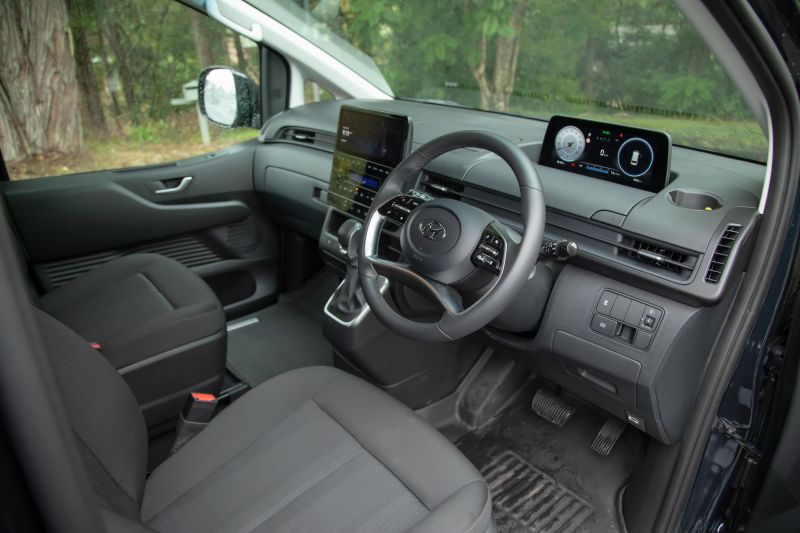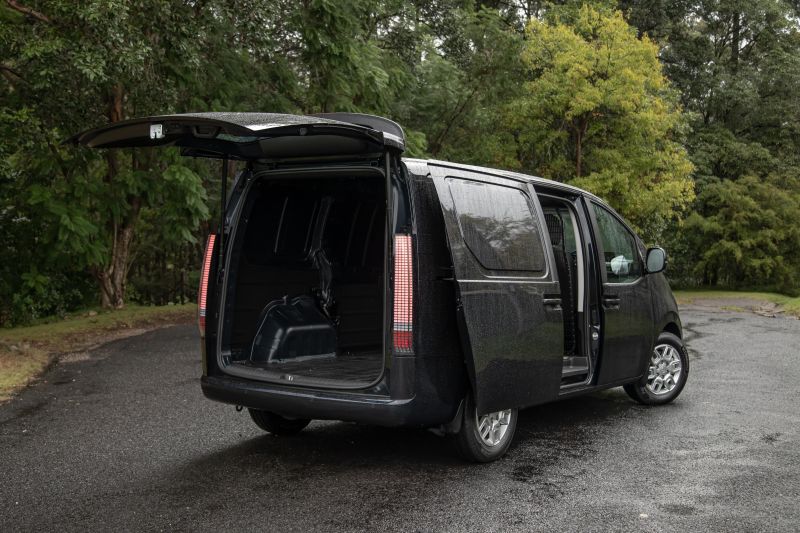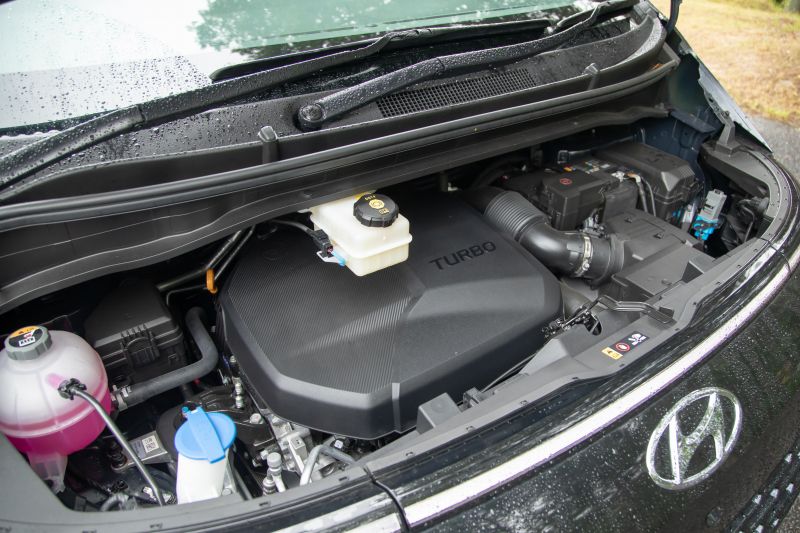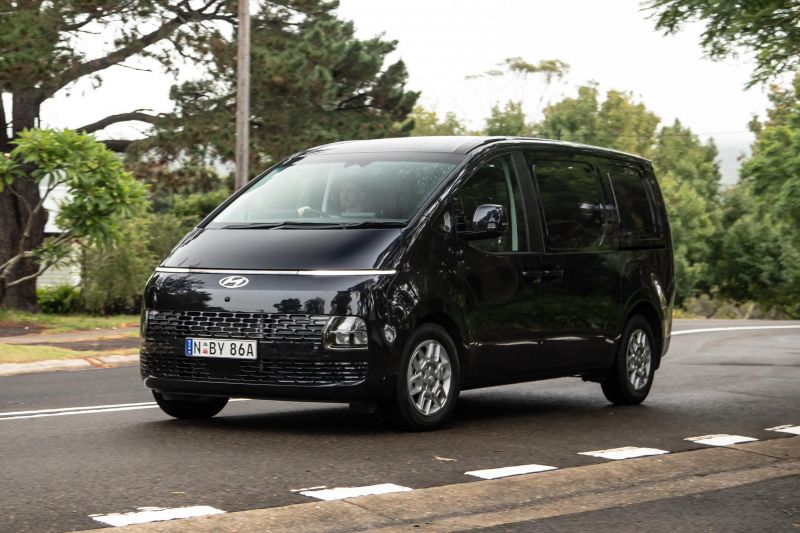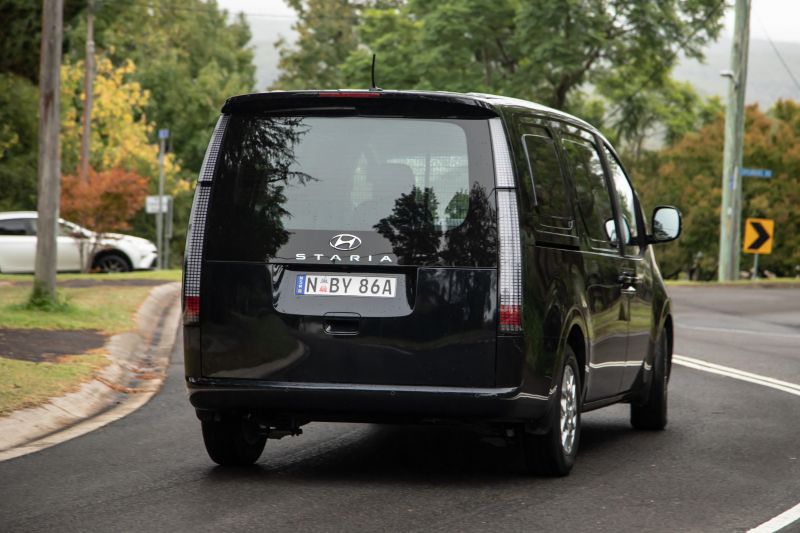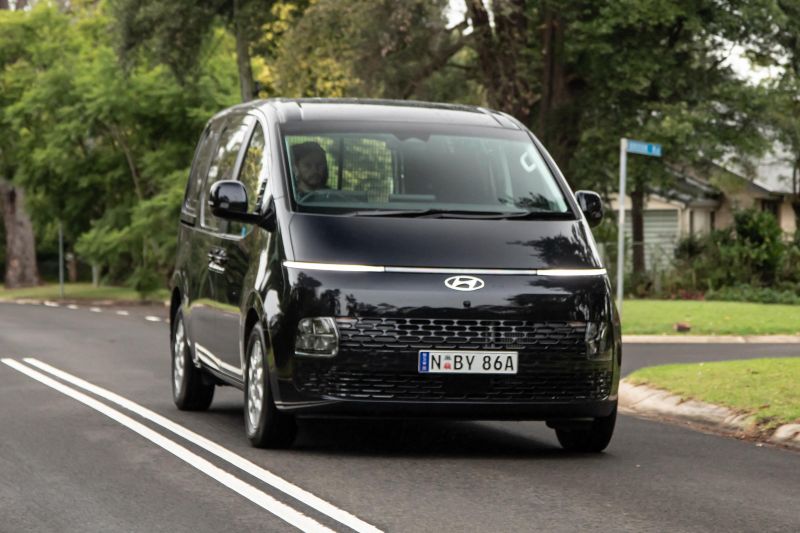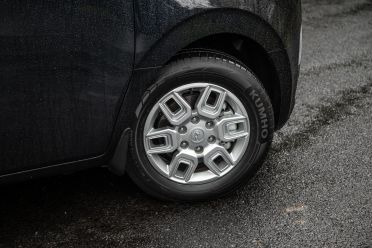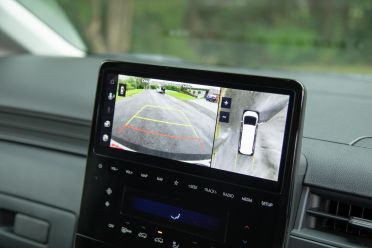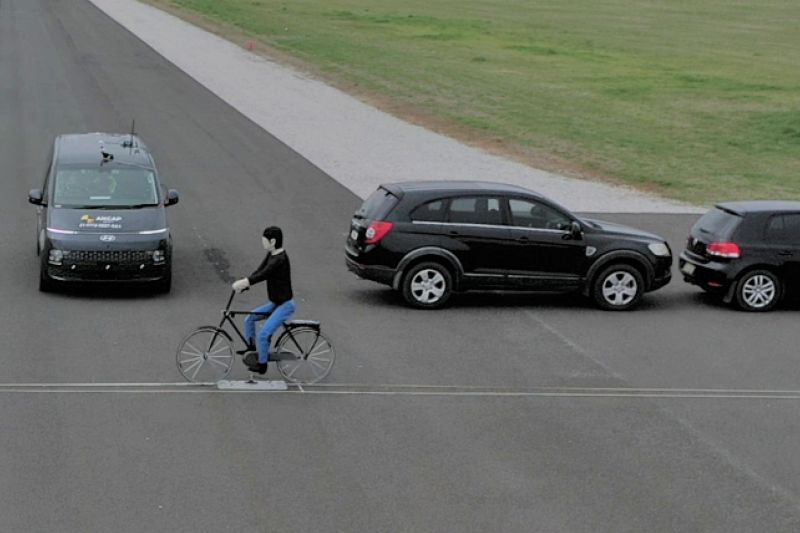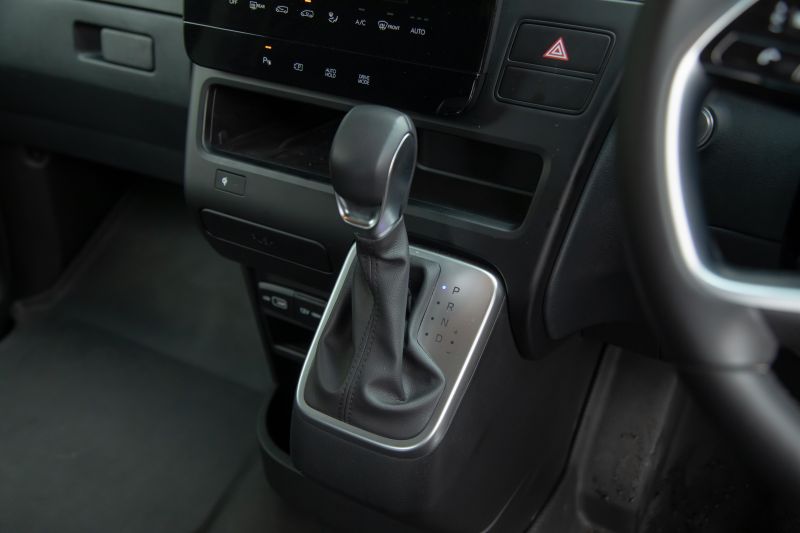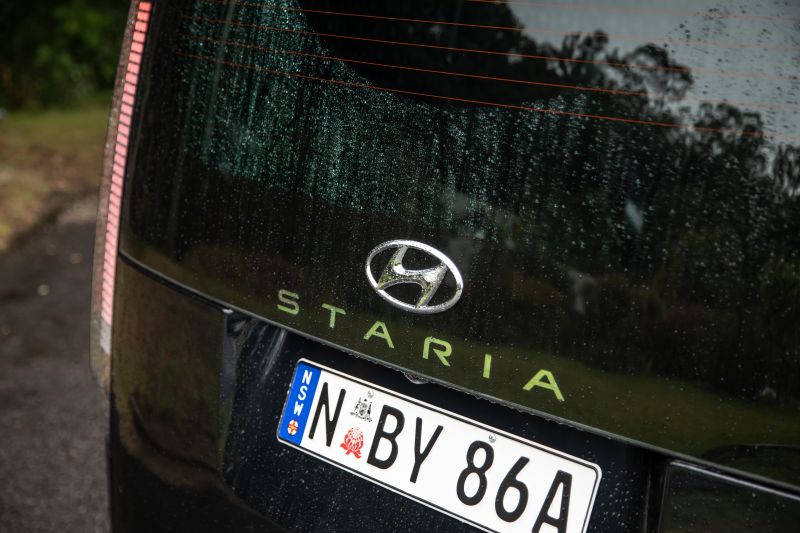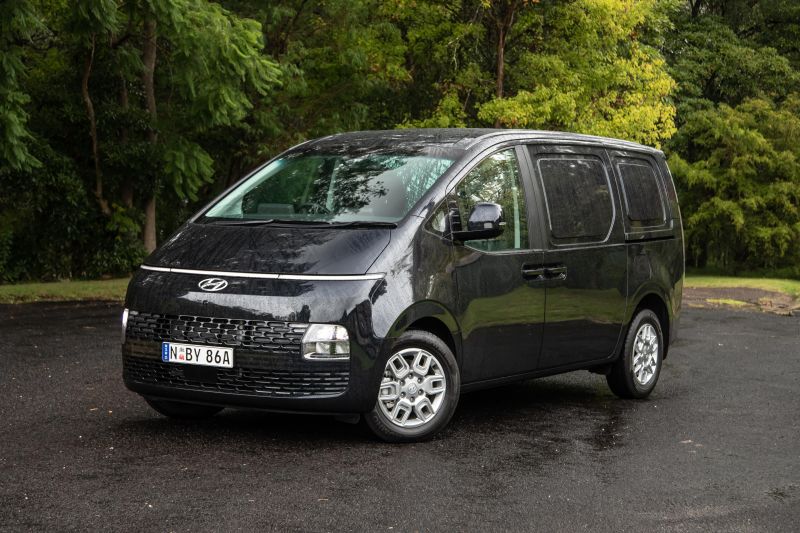Van buyers have got another option to choose from now, with the addition of the new Hyundai Staria Load Premium.
It costs $5500 more than the standard commercial van version, and isn’t available with the useful option of barn doors – nor can you get it with a second-row of seats.
So its appeal might be a bit limited, but the extras fitted to justify the premium for the, er, Premium model really help it stand out against rival vans such as the Toyota HiAce, Volkswagen Transporter, Renault Trafic, Ford Transit Custom and Mercedes Vito.
All the details are covered below.
How much does the Hyundai Staria Load Premium cost?
This new top-spec version of the Staria Load van is priced at $51,240 before on-road costs, or $5500 more than the standard two-seat van.
It’s only available with the lift-up tailgate, unlike the other versions of the Staria Load, which have the choice of Liftback or Twin Swing barn doors. The rest of the Staria Load range is unchanged for 2023
There’s quite a bit borrowed from the Staria people-mover model range, as you’ll see in the equipment section below, and the Staria Load Premium also comes with the $695 option of Graphite Grey metallic, Shimmering Silver metallic or Moonlight Blue mica (as tested).
You can still choose white if you want, with Creamy White remaining the choice at no extra cost. The non-Premium Staria Load models only have white or silver available.
This van also had a few optional accessories fitted, including front floor mats ($235), a cargo barrier ($899) and a heavy duty rubber cargo floor mat ($745).
2023 Hyundai Staria Load pricing:
- Hyundai Staria Load Van (Liftback or Twin Swing): $46,240
- Hyundai Staria Load Crew Van (Liftback or Twin Swing): $50,140
- Hyundai Staria Load Premium Van (Liftback): $51,740
Prices exclude on-road costs
What is the Hyundai Staria Load Premium like on the inside?
Well of course I’m going to say it’s a more premium interior than the standard Staria Load models – but it’s not quite the same level of extravagance you get in a Staria people mover in Highlander spec.
There are still plain black cloth seats, and a black-on-black interior that really does look more work-focused than plush – but it is a work van, so it has to be.
The telltale differences are the twin screens, which are bigger in this grade than the other versions, and unlike the lower-spec models, the driver info screen actually acts like a screen, rather than just a digitised instrumentation readout.
As such, it has a crisp look to it, with a bright display and the excellent Blind-Spot View Monitor giving the driver an “at a glance” view of what they might not have otherwise seen while driving. I’ve driven the non-Premium model, and these make a big difference to the day-to-day livability of this van, as it otherwise has huge blind spots.
The media screen steps up from an 8.0-inch touch display with big bezels and grippable controls to a larger format 10.25-inch screen, still touch-capacitive, but with a piano black panel and touch-sensitive buttons for all the system controls.
I’m not a massive fan of this style of controls, especially for a work van where you might be wearing gloves. At the very least the fan and temp controls have actual buttons.
It has a huge array of storage smarts on offer, including overhead storage slots (I like to call them folder holders), two closable lidded storage sections on the top of the dashboard as well as a cup holder for the driver. There’s another pop-out cup holder down near the gear selector, a couple of storage trays and a wireless phone charger, so there are ample spots for odds and ends.
And then there’s the doors, which have tri-layer storage on offer. Yep, three different sections for storing stuff, with the lowest part including a bottle holder section. It’s a bit of a reach, especially when you’re driving, but it’s extremely thoughtful, on the whole.
As for the cargo zone, 4935 litres is what Hyundai states, which – unless my maths is way off – means it offers 4.9 cubic metres of cargo volume. That’s okay, but other vans claim more – the HiAce for example quotes 6.2 cubic metres.
The cargo area dimensions are – 2607mm length; 1640mm width; 1235mm between the arches; 1436mm height; 573mm load-in height at tailgate.
And while we’re at it, if you’re curious about the exterior dimensions – it’s big. Too tall for plenty of city car parks, that’s for sure: 5253mm long (iLoad was 5150mm) on a 3273mm wheelbase (was 3200mm); 2000mm tall (up 65mm); and 1997mm wide (up 77mm).
There are eight floor-mounted tiedown tethers (D hooks), and an array of options for you to affix storage or racking systems to the interior of the vehicle.
The rear also features half-height lining (up to where the windows would be). As mentioned in the pricing section this test vehicle has a rubber lining on the floor, but you’ll have to option it. There are protected, non-slip sidestep areas for you to get in and out.
Sadly, the side sliding doors aren’t power assisted as you’d get on the Staria people mover, and that could’ve been a nice touch for this Premium grade – especially considering it has the electric tailgate. Plus, they’re 870mm wide, so not quite wide enough to fork in a pallet.
Now on that, it takes about 7.0 seconds to open and close because it is so large and it does really take up a lot of space. At least it is very high when open, if you plan to forklift items in.
It also has an auto closing function, which might get annoying. If you have the key in your pocket, it may auto close whether you want to or not. If you don’t (say, you’re standing under the tailgate with the key in your pocket) it continually beeps, which is annoying.
What’s under the bonnet?
As with the other versions of the Staria Load, there’s a 2.2-litre four-cylinder turbo-diesel producing 130kW of power (3800rpm) and 430Nm of torque (1500-2500rpm).
It makes use of a standard-fit eight-speed automatic transmission and has front-wheel drive.
Those outputs are lower than what you can get from a Toyota HiAce (140kW/450Nm) or some takes on the VW Transporter (up to 146kW/450Nm).
So, here’s a hack for you. If you wanted all-wheel drive and diesel, as you’d get in a Staria people-mover, you could buy that vehicle and remove the rear seats…?
What about towing capacity and the weight considerations for the Staria Load? It has a maximum towing capacity of 750kg for an unbraked trailer, and braked towing capacity of 2500kg. Just note that the maximum towball download weight is 100kg.
The gross vehicle mass (GVM) is 3020kg, and the tare weight is 1948kg – as a result, payload is 1072kg. If you prefer, the kerb mass is 2002kg, and the gross combination mass (GCM) is listed as 5520kg.
How does the Hyundai Staria Load Premium drive?
If you’re going to buy a van like this, you’re going to have weight in the back more often than not. That’s a good thing, because the unladen ride comfort is lacking in this van.
Other rivals in the segment are more comfortable to drive without a load in the cargo area. The Hyundai has a bouncy, unsettled ride at the rear when driving unladen. But even with a few hundred kilos of ballast in the back, it really settles down well.
The steering is a really positive point for the Staria Load, because it’s light and easy to turn the wheel at lower speeds. The turning circle isn’t too bad, either, at 11.9 metres. And at higher speeds it has a nice action and weight to it, too.
Visibility from the driver’s seat is mostly good, at least looking forwards. Despite the immense windscreen size the A-pillars can still get in the way of your view out, but I like the fact the side windows are also large, and the mirrors are good, too.
The Blind-Spot View Monitor is a fantastic bit of tech in a van like this, which is inherently hard to see out of when looking behind you.
The filled in panels (no windows in the cargo area, aside from the tailgate) make it especially challenging to see what’s behind and to the side of you
When you’re reversing out of a parking space, or indicating to turn into a side street, or even just merging at highway speed, these little rearward-facing cameras really make things a lot easier than otherwise are (trust me, I’ve driven the version of this van without that tech, and just having that almost makes the extra spend worthwhile). Who knows – it might even lower your insurance premium!
And finally on visibility, the LED headlights fitted to this grade of Staria Load are a revelation. Not only are you able to see the road better, but with the addition of the LED strip light across the bonnet, other road users including pedestrians and cyclists are able to see you better, too.
If you’ve read anything I’ve ever written about cars with halogen lights, you’ll know I think Hyundai should do the right thing by its consumers and just add the bloody LEDs to all grades. End rant…
The engine offers ample pulling power, and will be up for the task if you’re loaded, and if you’re running around with less mass, it’ll feel positively sprightly – in fact, you might find it wants to spin the front tyres, as there’s quite a lot of torque being channelled through the front axle.
It isn’t the quietest engine, but in any van there’s lots of noise to contend with. I’d be adding a proper steel or reinforced bulkhead to help quieten the cabin a bit more.
Shifting gears is an eight-speed automatic, which doesn’t really do much wrong. It is smooth enough at lower speeds, and allows the engine to use its torque when it thinks it needs to, too. That means fewer busy shifts for no reason, which is a plus.
The brakes are okay, but not the most confident in the way they pull the van up – sometimes you can be left thinking that you’ll stop quicker than you do. That’s even more of an issue when the van has a heavy load in the back, too.
It has an auto-hold function to keep the brake applied for you in traffic jams (just make sure you find where the button is!) and it will auto-apply the park brake if the vehicle detects you’re on a slope that warrants it.
What do you get?
Staria Load highlights:
- Choice of Liftback or Twin Swing rear doors
- Dual side sliding doors
- Halogen headlights
- 17-inch steel wheels
- Full-sized spare
- Heated, power-folding exterior mirrors
- Cloth upholstery
- 8.0-inch touchscreen infotainment system
- Wireless Apple CarPlay, Android Auto
- Wireless phone charging
- Digital driver information displays
- Leather-wrapped steering wheel and shifter
The Crew Van model is based on the more basic version, and adds a centre console storage box, a three-seat second-row bench, and glazed sliding doors.
Staria Load Premium (Liftback only) adds:
- LED headlights and tail lights
- LED daytime running light strip
- Automatic high-beam lights
- 17-inch alloy wheels incl. full-size spare
- 10.25-inch digital instrument cluster
- 10.25-inch touchscreen infotainment system
- Satellite navigation
- Wired Apple CarPlay, Android Auto
- Blind-Spot View Monitor
- Keyless entry and start
- Power tailgate
It’s clear you’re getting your $5500 worth when you choose the Premium model. It’s just a matter of whether you and your business wants that stuff, or needs it.
Is the Hyundai Staria Load Premium safe?
The Hyundai Staria Load was awarded the maximum five-star safety rating from ANCAP in 2021
It has also been named a Platinum performer for collision avoidance, topping the medium van class and becoming the first model to achieve that accolade in Australia, ahead of the Mercedes-Benz Vito and Toyota HiAce with their Gold ratings.
Standard safety equipment includes:
- Autonomous emergency braking
- Pedestrian, Cyclist detection
- Junction-turning assist
- Blind-spot assist
- Blind Spot View Monitor (cameras)
- Rear cross-traffic assist
- Lane keep assist
- Lane Following Assist (lane centring)
- Adaptive cruise control with stop/go
- Surround-view cameras (Liftback only)
- Leading vehicle departure alert
- Driver attention warning
- Intelligent speed limit assist
- Front and rear parking sensors
- Safe exit warning
- 7 airbags incl. front-centre airbag
Safe to say, this is a safe bet for van buyers then.
How much does the Hyundai Staria Load Premium cost to run?
The Staria Load is covered by a five-year, 160,000km warranty which is less than you get if you buy a non-commercial vehicle from Hyundai, which come with unlimited kays of warranty cover.
There is capped-price servicing for the life of the vehicle, and if you service with Hyundai’s workshop network, you’ll get lifetime roadside assistance included, too.
Servicing is every 12 months/15,000km, which is shorter than some rivals in the van space (Renault has 30,000km intervals, for example), but better than you get if you choose a HiAce (six month/10,000km intervals).
If you prefer, there’s a prepay servicing plan available, either three-year/45,000km ($1080), four-year/60,000km ($1440), or five-year/75,000km ($1800). The prices are the same whether you prepay, or pay as you go.
When it comes to fuel costs, the official combined cycle fuel consumption for the Staria Load van range is the same across the line-up, at 7.0 litres per 100 kilometres.
If you’re running with a load all the time, you’re going to get a higher figure than that. However, on the open road with a light load, you will get close, or maybe even better than that – over my week of mainly unladen testing, I saw a return of 8.6L/100km in urban, highway and freeway driving.
It has a 75-litre fuel tank. There is no AdBlue tank for the Staria Load, as it is Euro 5 – so it has a diesel particulate filter but no exhaust after-treatment.
CarExpert’s Take on the Hyundai Staria Load Premium
The Staria Load Premium will likely appeal to small business owners who aren’t dependent on forklift loading their vans with larger items, as that large, slow-moving electric tailgate could be a pain.
The fact you get twin sliding side doors as standard lessens the blow, though they are still not wide enough to fork a load in.
But as a plusher-than-average option for a plumber, painter, carpenter, or delivery driver, it really does offer a lot to like.
Click the images for the full gallery
MORE: Everything Hyundai Staria

